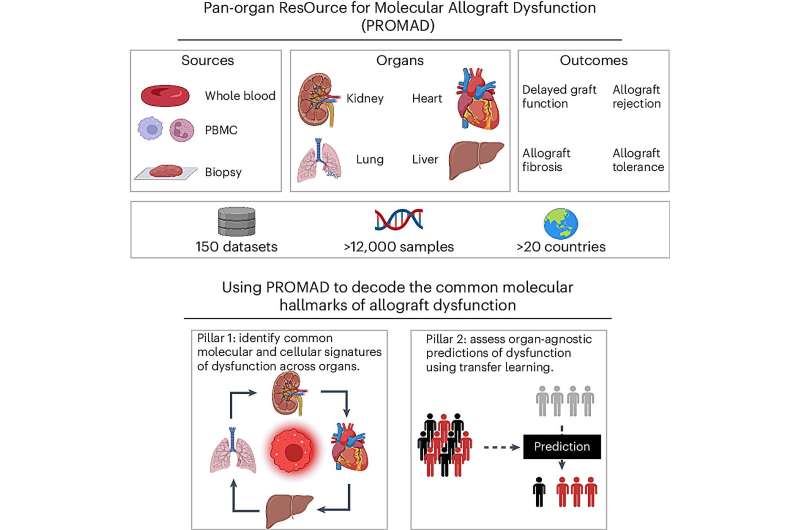This article has been reviewed according to Science X's editorial process and policies. Editors have highlighted the following attributes while ensuring the content's credibility:
fact-checked
peer-reviewed publication
proofread
Molecular biomarkers for transplant medicine—AI-driven insights predict organ transplant success

In a study published in Nature Medicine, an interdisciplinary team of researchers from The Westmead Institute for Medical Research (WIMR) and the Sydney Precision Data Science Centre at the University of Sydney have, for the first time, identified molecular biomarkers for transplant rejection that are common to all the major transplanted organs: hearts, lungs, livers, and kidneys.
This significant advancement led by Harry Robertson, a Ph.D. student at the University of Sydney, and aspiring bioinformatician at WIMR, uses machine learning to predict transplant outcomes with unprecedented accuracy.
Mr. Robertson said, "Our research indicates that there are underlying molecular pathways involved in organ rejection that are consistent across different solid organs. This discovery is pivotal as it allows us to develop strategies to enhance the success rates of all transplants."
Working together, the team created the Pan-organ ResOurce for Molecular Allograft Dysfunction (PROMAD), a molecular atlas consisting of more than 12,000 patient samples from around the globe. This atlas will enable researchers to interact with data on transplants that was previously inaccessible to many researchers, and encourage global collaboration.
Mr. Robertson added, "This atlas has led to the development of a proof of principle for a universal blood test that can predict the likelihood of transplant rejection before it occurs, potentially setting a new standard in precision medicine and improving outcomes for transplant recipients worldwide."
Professor Natasha Rogers, Deputy Director of WIMR's Centre for Transplant and Renal Research, and a senior author on the study, highlighted the practical applications of the findings. He said, "We are now testing a blood test in the lab that could soon allow doctors to predict and prevent organ rejection. More than that, our findings lay the groundwork for applying these strategies to other forms of transplantation and even other diseases."
Associate Professor Ellis Patrick, a senior author and bioinformatician at both WIMR and the Sydney Precision Data Science Centre, emphasized the future potential of this research. He said, "I have seen early career researchers becoming increasingly confident in analyzing big data sets. By helping these researchers get access to data, I am confident that we'll be seeing a wave of new research that will enrich our understanding of organ transplantation."
The promising results from this study are not just a testament to the collaborative effort of the international research community, but also a beacon of hope for millions waiting for life-saving transplants.
"This study is a perfect example of how precision medicine can significantly impact clinical practices by integrating global data to benefit individual patients," Professor Rogers added.
The next phase of the research will focus on extending these findings to other types of transplants and continuing to refine the predictive models used in the study.
More information: Harry Robertson et al, Decoding the hallmarks of allograft dysfunction with a comprehensive pan-organ transcriptomic atlas, Nature Medicine (2024). DOI: 10.1038/s41591-024-03030-6



















